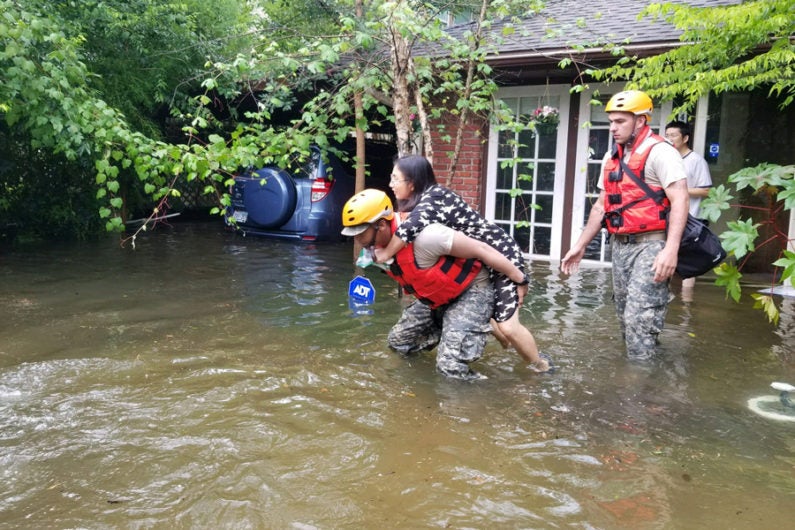August 29, 2017
Stanford experts available to comment on Hurricane Harvey and impact on Texas coast
With thousands flooded and rain expected to continue for days in Houston and surrounding areas, Stanford experts on extreme events, coastal adaptation, stormwater infrastructure and related topics are available for comment.
By Stanford Woods Institute for the Environment
Devastating torrents of rain continue to fall on Houston and parts of Texas as Hurricane Harvey moves east. The storm made landfall on Friday night and has hit Houston and surrounding areas hard with thousands flooded, several fatalities and 50 total inches of rain predicted by Thursday afternoon.

Texas National Guard troops rescue stranded families from Houston flooding. (Image credit: Lt. Zachary West , 100th MPAD)
Stanford experts ranging from climate scientists to legal experts are available for comment on the storm’s physical, economic and environmental impacts and what can be done to better prepare for these crises in the future.
Hurricane Harvey & Climate Science
Noah Diffenbaugh
Noah Diffenbaugh is an expert on the climate system and understanding the influence of climate change on extreme events, including storms, droughts and other environmental disasters. He has served as a lead author for Working Group II of the Intergovernmental Panel on Climate Change and has provided testimony and scientific expertise to the White House, the governor of California, and U.S. congressional offices. Diffenbaugh is a professor at Stanford’s School of Earth, Energy & Environmental Sciences and Kimmelman Family Senior Fellow at the Stanford Woods Institute for the Environment.
Contact: (650) 223-9425, diffenbaugh@stanford.edu
See op-ed in the New York Times, “Hurricane Harvey Was No Surprise”
Chris Field
Chris Field’s research emphasizes field and laboratory studies of impacts of climate change, from the molecular to the global scale. From 2008 to 2015, Field was co-chair of Working Group II of the Intergovernmental Panel on Climate Change. He is the Perry L. McCarty Director of the Stanford Woods Institute for the Environment; founding director of the Carnegie Institution for Science’s Department of Global Ecology; the Melvin and Joan Lane Professor for Interdisciplinary Environmental Studies at Stanford’s School of Humanities and Sciences and School of Earth, Energy & Environmental Sciences; and senior fellow at the Precourt Institute for Energy.
Contact: (650) 736-4352, cfield@stanford.edu
Coastal Adaptation & Resilience
Katharine Mach
Katharine Mach’s research is focused on assessment of climate change risks and response options. She has specific understanding of coastal adaptation to impacts of increased storm surge and sea level rise. From 2010 to 2015, Mach co-directed the scientific activities of Working Group II of the Intergovernmental Panel on Climate Change, which focuses on impacts, adaptation and vulnerability. Mach is the director of the Stanford Environment Assessment Facility (SEAF) at the Stanford Woods Institute for the Environment, a senior research scientist in Stanford’s School of Earth, Energy & Environmental Sciences and a visiting investigator at the Carnegie Institution for Science.
Contact: (650) 736-3556, mach@stanford.edu
Eric Hartge
Eric Hartge specializes in climate change impacts to coastal environments and coastal adaptation and resilience strategies with a focus on the preservation of natural features. He works with the Natural Capital Project and Stanford Law School using the spatial analysis tool “InVEST” to incorporate multiple benefits from natural habitats in decision processes regarding coastal adaptation planning. Hartge is the research development manager for the Center for Ocean Solutions.
Contact: (650) 213-6887, ehartge@stanford.edu
Managing Urban Stormwater
Newsha Ajami
Newsha Ajami is a hydrologist and an expert on sustainable water resource management, flood and water supply forecasting, stormwater and urban water policy, and water project financing. Ajami is director of urban water policy with Stanford’s Water in the West Program and a senior research associate at the Stanford Woods Institute for the Environment. She also co-leads the Urban Water Systems & Institutions Thrust at the NSF-ReNUWIt Engineering Research Center and is a member of the Bay Area Regional Water Quality Control Board.
Contact: (650) 724-8162, newsha@stanford.edu
Richard Luthy
Richard Luthy is an expert in environmental engineering, stormwater and water quality. His work addresses how cities can control flooding, specifically flooding caused by storms. He is the Silas H. Palmer Professor of Civil and Environmental Engineering at Stanford and the director of the NSF-ReNUWIt Engineering Research Center.
Contact: (650) 721-2615, luthy@stanford.edu
Laws, Economics, & Insurance Issues with Major Storms & Disasters
Barton “Buzz” Thompson
Buzz Thompson is a leading expert in environmental and natural resources law and policy. His scholarship on environmental issues ranges from the future of endangered species and fisheries to the use of economic techniques for regulating the environment. He is the founding director of the Law School’s Environmental and Natural Resources Program and founding Perry L. McCarty Director and senior fellow of the Stanford Woods Institute for the Environment.
Contact: (650) 723-2518, buzzt@stanford.edu
Charles Kolstad
Charles Kolstad is an internationally known environmental economist with a focus on industrial organization and public economics. He has been a convening lead author for the Intergovernmental Panel on Climate Change. Kolstad is an expert on economic issues surrounding climate change and can speak to impacts on cities, individuals and governments from major environmental disasters. He is a senior fellow at the Precourt Institute for Energy, senior fellow at the Stanford Woods Institute for the Environment and senior fellow at the Stanford Institute for Economic Policy Research.
Contact: (650) 721-1663, ckolstad@stanford.edu
-30-
|